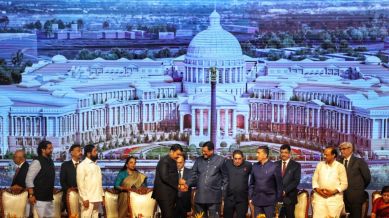Stay updated with the latest - Click here to follow us on Instagram
Judges no more feudal lords, ensure no extravagance at new HC building: CJI Gavai
Justice B R Gavai referred to comments by Chief Minister Devendra Fadnavis, who was also present at the event.

Chief Justice of India (CJI) Bhushan R Gavai on Wednesday said that there should be “no extravagance” at the new Bombay High Court building to be constructed at suburban Bandra (East) as “judges are no more feudal lords” and serve the citizens under the Constitution.
CJI Gavai, who served as a Bombay High Court judge for nearly 16 years before his elevation to the Supreme Court in 2019, was speaking at the foundation stone-laying ceremony for the new High Court building in Bandra.
monthly limit of free stories.
with an Express account.
Justice Gavai referred to comments by Chief Minister Devendra Fadnavis, who was also present at the event. Fadnavis said that the new HC building “should be of democratic grandeur and not imperialistic grandeur”.
Speaking at the event, Fadnavis said, “Imperialistic grandeur is to show the might of the king. Now we are in a democracy. So all the functional areas in this building should depict the democratic values of this nation, of our constitution. And it should actually give a promise to everybody that they will get justice here. So I request you that the grandeur of this building should be great.”
Deputy Chief Ministers Eknath Shinde and Ajit Pawar, Chief Justice Shree Chandrashekhar of Bombay HC and other judges were also present at the event.
CJI Gavai in his address said, “I have no doubt that the building which has been designed by architect Hafeez Contractor, who is known as one of the best architects in the world, will be an iconic building. But at the same time, taking forward the line of CM Fadnavis, the building should not depict an imperial structure, but be in tune with the democratic values which our Constitution so much imbibes.”
Justice Gavai referred to news articles stating that the new building was “somewhat extravagant”, with one lift to be shared by two judges. He said, “I would only like to say that judges are no more feudal lords. The judge may be of the Trial Court, High Court or the Supreme Court. They all, or rather all our institutions, judiciary, legislature, executive, they work under the Constitution to serve the last citizen of this country, to provide justice to the society.”
“While maintaining the grandeur and iconic structure of the building, it should also be ensured that there is no extravagance, that it is ultimately a temple of justice, not a seven-star hotel,” he added.
CJI Gavai said that the HC building committee and architect can make necessary modifications to the plan while also considering “future demands” and needs of litigants after taking views from the lawyers’ associations.
Justice Gavai said that many of the courtrooms and chambers at the “iconic” building of Allahabad High Court at its bench in Lucknow have been lying vacant for years and that similar issues were faced at the Aurangabad bench of the Bombay HC.
“I think all these issues arise because while planning the building, while we concentrate on the needs of the judges, we should not forget that ultimately all of us exist for the citizens of this country, the litigant who comes to the court to seek justice. The members of the Bar are equal stakeholders in the preparation of the plans. Justice. Unless Bar and the Bench work together, the administration of justice will not be efficiently administered.”
CJI Gavai, who will demit office on November 23 said, “I end my tenure by laying the foundation of one of the most prestigious buildings that the country, that the world would see. I have no manner of doubt that this will be the best court building in the entire country.”